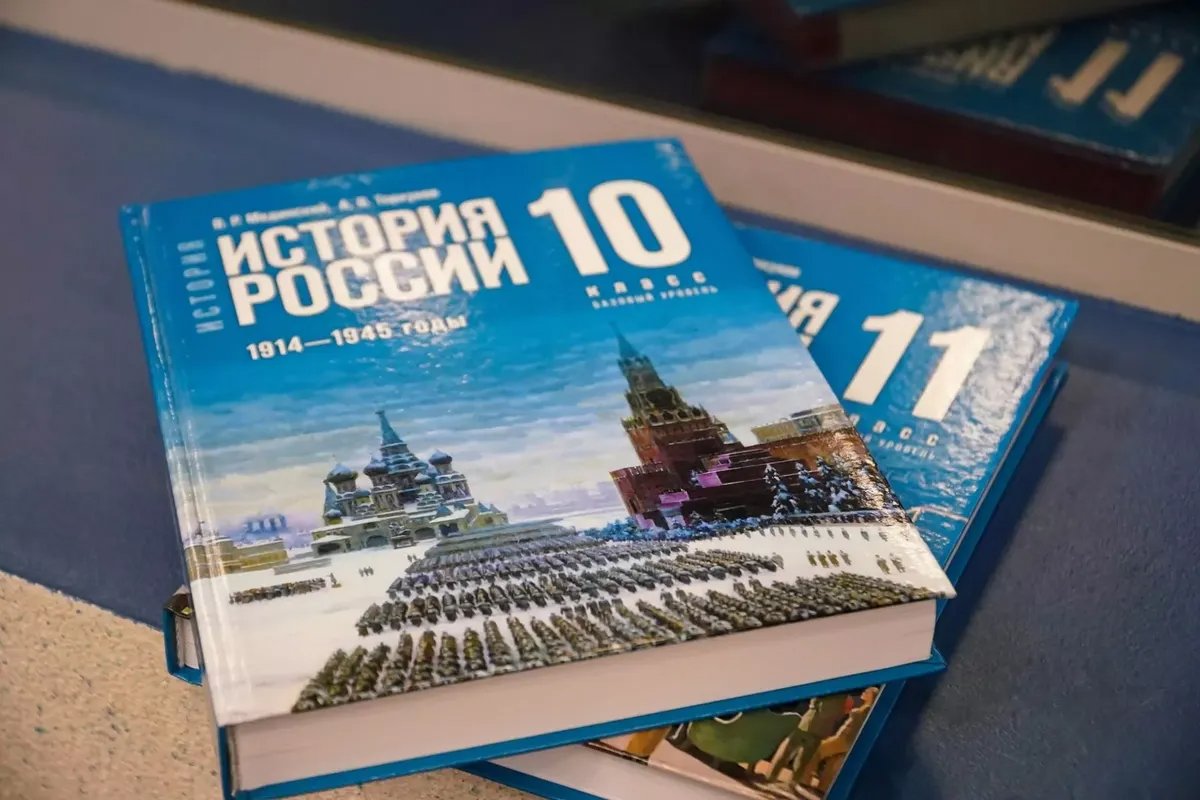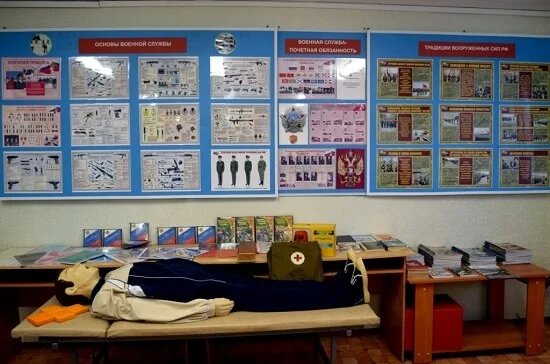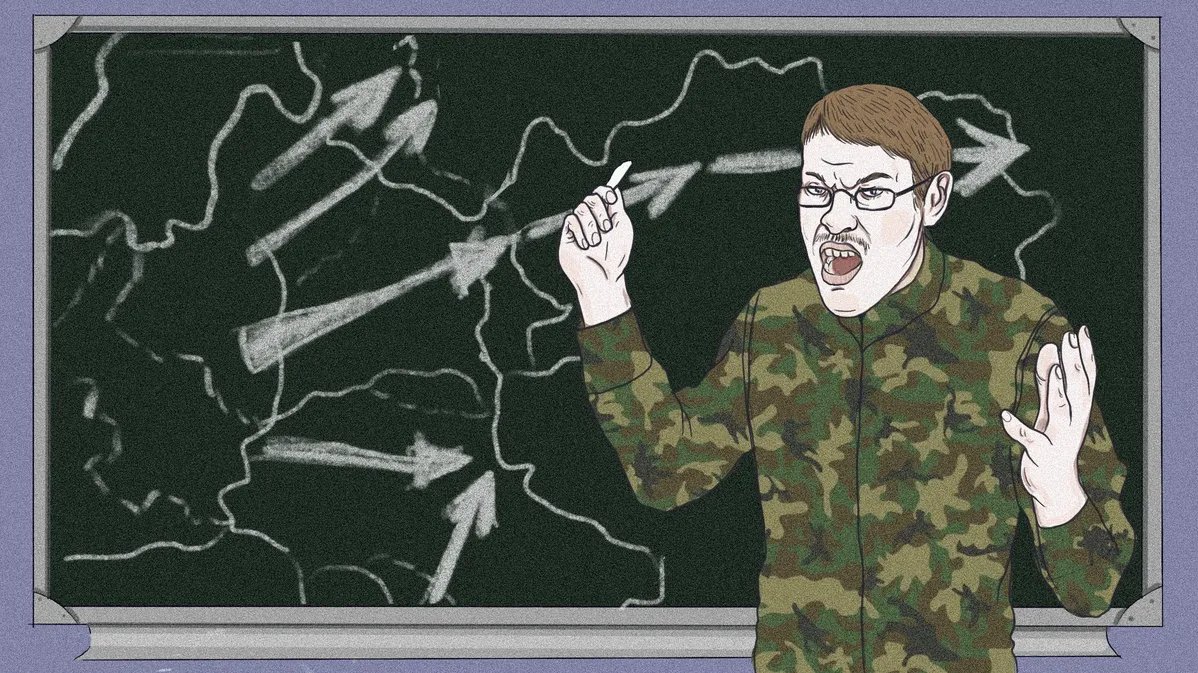Starting from 1 September, Russian schoolchildren will be taught using a new curriculum that will see the return of basic military training and the introduction of new textbooks for both history and social studies. Novaya Gazeta Europe has spoken to experts and educators to find out what is going to change for pupils, and we also had parents tell us what they expect and fear from the new curriculum.
‘The end of civilisation’
“The West became obsessed with destabilising the situation inside Russia, initially along its borders. For this, they sponsored outright Russophobia in the countries of the former Soviet Union. The next stage in their plan was to draw Russia into a series of conflicts and “colour revolutions”, to destabilise its economy, and to replace its authorities with puppets. The ultimate goal was an open secret: to break Russia up and seize control of its resources.”
Above is an excerpt from the new history textbook for Russian pupils in grades 10 and 11. One of the co-authors of the course is Vladimir Medinsky, the country’s former minister of culture. The chapter he authored, entitled “Russia today. The special military operation”, summarises the objectives of Russia’s full-scale invasion of Ukraine as “the protection of the Donbas and pre-emptively ensuring Russia’s security”.
In other paragraphs, Ukraine is described as “an ultra-nationalist state enjoying so-called independence that the US and NATO have been preparing as a major wedge to use against Russia”.
When reading news about the war in Ukraine, the textbook advises pupils to “be vigilant” and “to consider why and for what kind of reward those opposed to the war promote their agenda”, as well as to be aware that “the global production of staged videos, misinformation, and fake photos and videos works as a round-the-clock industry”.
In July, excerpts from the new textbook on Russian history, reviewed by Anatoly Torkunov, the rector of Moscow’s State Institute of International Relations, were also published. Among other things, the book claims that if not for Russia’s invasion of Ukraine, “it could potentially have been the end of the civilisation”.
Priorities of state policy
Russia’s educational institutions are to use a single federal curriculum that uses just one textbook for almost every subject, according to Sergey Kravtsov, Russia’s minister of education.
Most of these textbooks are produced by the same publishing house responsible for almost all the textbooks used in the Soviet Union.
One education policy expert who spoke to Novaya-Europe on condition of anonymity said that the publishing house in question now enjoys a monopoly in the Russian textbook market, just as it did during the Soviet era, and that it served “an entirely ideological purpose … forcing militaristic patriotism on students”.
Describing the new curriculum as a “mono-ideology” that is “nowhere near flexible”, the expert accused “professionals from the Education Ministry” of attempting to “control the minds of school children”.

A new history book for grades 10 and 11. Photo: The Russian Education Ministry’s press service
One teacher of history and social studies, also speaking on condition of anonymity, told us that previous textbooks also contained elements of propaganda in them. For instance, the chapters that covered the recent decades of Russia’s history gave a positive assessment of Vladimir Putin’s rule and briefly mentioned Crimea’s “return” to Russia, while its chapters on Russia’s economic development noted that Russia had its own unique destiny and a powerful economy.
Apart from the four textbooks co-authored by Medinsky, there are two further books on Russia’s most recent history included in the new curriculum. Excerpts from one of them, written by Vyacheslav Nikonov and Sergey Devyatov, were recently leaked by the media.
The book claims that the US and “its European vassals” have been using Ukraine as “a fist aimed at Russia” and a “stepping stone for a NATO attack”, so Russia was “forced to take preventive measures”. The objectives of the full-scale invasion of Ukraine are claimed to be “ridding the Donetsk People’s Republic and the Luhansk People’s Republic of daily shelling, ensuring their sovereignty”, as well as “demilitarisation and denazification”. The chapter on the “special military operation” ends with a WWII-era Soviet slogan: “Our cause is just! The enemy will be routed! We shall prevail!”
In addition to the history textbooks, a new textbook on social studies is also in the works. The key concept behind the new textbook, according to Kravtsov, is “understanding the unconditional value of Russia’s state sovereignty” and Russia’s role in “creating a just world order”.
Support independent journalism
Nothing to write about
According to the anonymous educational expert, many families support the introduction of a single curriculum as “parents were confused” by the vast array of different textbooks on offer.
One parent of a Moscow high schooler said they thought a multitude of textbooks was a bad thing: “There are some textbooks with complete nonsense written in them. In the Soviet Union, there was only one textbook [for each subject] and you could get additional knowledge from other sources, such as books,” the man added.
At the same time, he said he was against adding chapters on the “special military operation” to the curriculum. “[This should be done] in about a decade when things get settled,” he believes. “For now it’s simply propaganda rather than history. And I am against propaganda in history”.
A mother of a schoolgirl from the Moscow region is of the same opinion.
“I believe the war should be over before it is put in a text book. There’s nothing to write about now,”
she says.
Another parent from Moscow feels that school children need to learn about current events and thinks that textbooks should cover them “in a completely neutral manner, nothing but straight up facts”.
“You can’t just drop it from the textbooks, the high schoolers know about everything anyway. History classes should teach youngsters how to think over and reflect on things. What kind of conclusions they draw from it is completely up to them and their families,” she explains.
Protecting the Motherland
In addition to the changes to teaching history and social studies, the subject known as The Fundamentals of Life Safety will now include a course of basic military training.
For instance, pupils in grade 10 will be taught marching drills and military salutes, as well as the basics of handling weapons, ground combat actions, and first aid treatment.
From next September, schools will start teaching a subject called The Fundamentals of Safety and Protecting the Motherland, the curriculum of which is still being developed.

Photo: Rektor.ru
Sergey Kravtsov also suggested that “lads who fought in the special military operation” be invited to schools for meet-and-greet sessions. On top of that, it was reported that the basic military training course would include the basics of drone warfare.
The Fundamentals of Life Safety was introduced as a subject in the 1990s to replace the Soviet basic military training class. The USSR introduced it as it considered a nuclear strike upon its territory to be a real threat, a Fundamentals of Life Safety teacher from Chelyabinsk explains.
However, as the Soviet Union collapsed, Russia’s authorities discovered other threats, such as HIV and drug addiction, as well as traffic and fire safety. These were the reasons behind the streamlined Fundamentals of Life Safety subject. But now the focus is being returned to warfare again.
Propaganda of death
Parents who spoke to Novaya Gazeta Europe believe that basic military training may be useful to keep school children in good physical shape.
“If this course includes first aid treatment and ground navigation instead of weapons only, this isn’t at all a bad thing,” a mother of a schoolgirl from Novosibirsk says.
However, all the parents we spoke to were against involving combat action veterans: either due to them lacking teaching qualifications or over fears that some of the things they might share with the children could be traumatising.
“It’s outright crazy to let a war veteran speak to children while he is still traumatised himself. I think it propagates death rather than heroism and patriotism,” the mother of a Siberian high-schooler believes.
New borders
The educational expert believes that textbooks in other subjects will also be gradually updated to keep them in line with federal educational standards and the standardised curriculum. He also believes that the introduction of single textbooks “will cause a sharp decrease in pupil’s creative potential”, something he fears “always goes hand in hand with a blow to critical thinking and emotional intelligence”.
Although there have yet to be any changes to the geography textbook, a teacher from Siberia reported how she recently bought some maps and atlases for grade 8 and 9 students. “Those have ‘the new national borders’ in them, and the tasks were also adjusted to the current reality,” the teacher said.
What will happen next?
All state accredited public and private schools in Russia will have to abide by the new requirements and there will be no option for pupils to drop basic military training or history classes.
Parents who will allow their children to do that will most likely be fined for “faulty parenting”, Daniil Ken, the leader of the Teachers’ Alliance, an independent trade union for teachers, says. “The fine is pocket change in financial terms, but police attention will scare people far more.”
The parents of high schoolers that do not wish their children to discuss “the special military operation” in school hope that the teachers will simply overlook these new requirements, just as many of them already do with the Important Conversations propaganda classes.
Novaya-Europe spoke to two sets of parents who were considering homeschooling their children if the situation gets worse.
However, the educational policy expert stresses that even the harshest of Russia’s laws are not strictly obeyed in practice, and that “there are enough talented teachers with clear liberal values” in the country.
“There are still many talented headmasters, teachers, and parents that want their children to be people of peace, to have creative brain power, and to generally be happy. This is why any strict guidelines are doomed to fail, especially in our online age,” he concluded.
Join us in rebuilding Novaya Gazeta Europe
The Russian government has banned independent media. We were forced to leave our country in order to keep doing our job, telling our readers about what is going on Russia, Ukraine and Europe.
We will continue fighting against warfare and dictatorship. We believe that freedom of speech is the most efficient antidote against tyranny. Support us financially to help us fight for peace and freedom.
By clicking the Support button, you agree to the processing of your personal data.
To cancel a regular donation, please write to [email protected]

